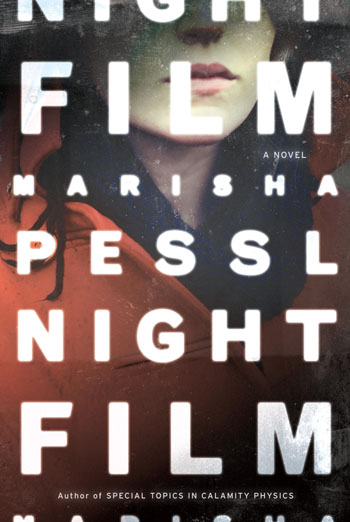“A journalist with a vendetta plumbs a subculture of film fans in Marisha Pessl’s Night Film—a terrifically haunted follow-up to her Special Topics in Calamity Physics,” begins Ellen Wernecke at the AV Club. “Decades after his final film, director Stanislaus Cordova is revered by horror enthusiasts who throw debauched underground screenings of his banned films and congregate on a densely coded forum called the Blackboards to collect clues about his life. Scott McGrath’s obsession with him is just as strong but of a different shade: Investigating the director based on an anonymous tip cost McGrath his job and his marriage, but he’s unable to resist digging up his old notes when the director’s daughter Ashley, a piano prodigy, is found dead in a vacant building in Chinatown.”
McGrath is “joined by a shabby but smoldering drug dealer named Hopper and a breathless ingénue, Nora Halliday,” writes Joe Hill in the New York Times Book Review. “Together, the three make an adorably awkward family of misfits, who will be even more appealing should George Clooney, Ryan Gosling and Alison Brie be cast for the movie adaptation. Cordova himself—a dark riff on Kubrick, with a pinch of Friedkin and a sprig of Banksy thrown in for good measure—stays offstage, casting his long, creepy shadow across the actors throughout the course of the drama…. In the first two-thirds of the book, Pessl captures the feel of one of Kubrick’s compact, relentless chillers, but during [its] not-quite-climactic climax, Night Film begins to feel more like one of his glacially paced statements—Eyes Wide Shut, without the redeeming value of celebrity nudity.”
The Boston Globe‘s Eugenia Williamson argues that the first chapter alone “should go down in literary history as among the most notable formal innovations of this century. It consists of a series of Web pages—20, all told… Pessl and her designers ape perfectly a New York Times obituary and a Time magazine slideshow, from the irascibility of Internet commenters (‘God forbid something be dark, freakish, and so unnerving you question your commercialised, corporate-sponsored view of the world’) to Facebook ‘Like’ buttons. Many of the evocative and completely plausible photos therein were staged especially for the book, using actors that Pessl auditioned herself. They pop up in the newspaper clippings, Web pages, and police dossiers, sifted by a crusading writer, that appear throughout the book.”
Alexandra Alter for the Wall Street Journal: “Ms. Pessl says she was aiming to capture the way contemporary storytelling has become ‘a 360-degree experience’ by releasing the story as layers of narrative through multiple channels, as a novel, an app, and as videos and images on websites like YouTube and Tumblr. ‘If someone Googles “Cordova,” they can find tastes of his works,’ she says. ‘It adds layers of narrative.’ Early reviews of Night Film have veered from fawning to searing.”
For the Los Angeles Times‘ David L. Ulin, Night Film is, “at 600-plus pages, at least a third too long, an overwrought narrative that hints at much but delivers little and, for all its feints and twists, remains surprisingly unsuspenseful in the end.” It “has the feel of a novel that may have incubated a bit too long.” And as for all those Web pages, newspaper clippings, and so on, “The idea is to seed the story with artifacts from the real world and, in so doing, make it feel more rooted. The effect, though, is precisely the opposite, to enhance the novel’s artificiality.” The same can probably be said of the trailer and “found footage” embedded here.
“There is a haunting suspicion running all through Night Film: that this book was more exciting to write than to read.” The NYT‘s Janet Maslin: “Ms. Pessl seems to take it as a given that this book, like its absent genius, warrants fascination. Where’s the evidence? Not on the page.”
Nitsuh Abebe profiles Pessl for New York. Meantime, for the Atlantic Wire, Alexander Abad-Santos gathers evidence for the argument that the interactive novel is on the rise.
Update: For Michelle Dean at Flavorwire, “it’s not actually the plot that bothers me, nor the characterization, what little there is to speak of. Nor is it even the prose, though I think some of her metaphors are better termed record-scratches. No, it’s the multimedia that bothers me.” And she explains—quite well, too.
For news and tips throughout the day every day, follow @KeyframeDaily on Twitter and/or the RSS feed. Get Keyframe Daily in your inbox by signing in at fandor.com/daily.




